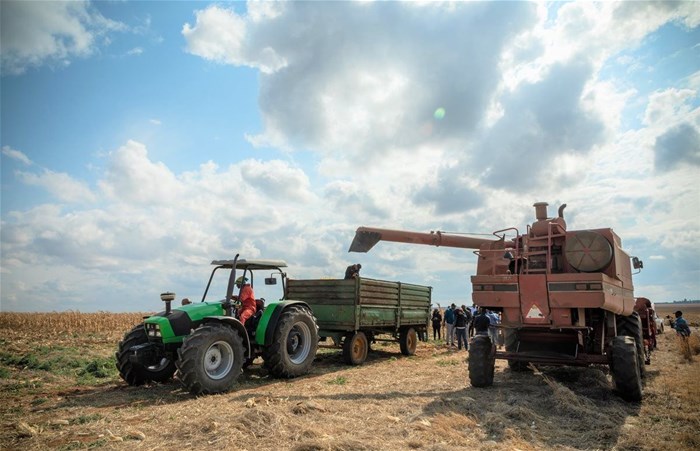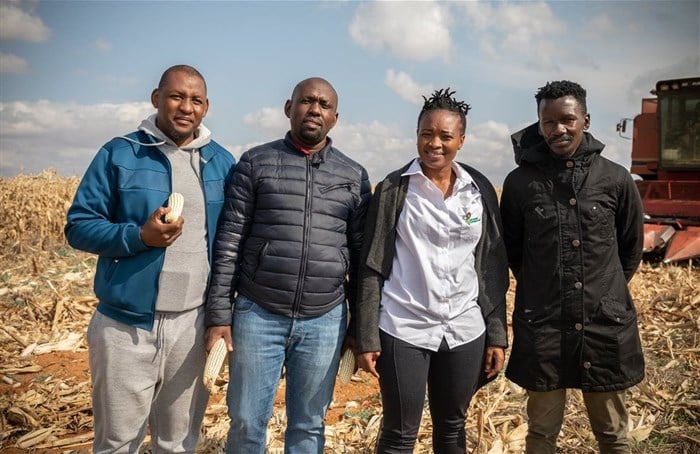
Related
Top stories





Energy & MiningGlencore's Astron Energy gears up with new tanker amidst Sars dispute
Wendell Roelf 12 hours

More news

















Logistics & Transport
Uganda plans new rail link to Tanzania for mineral export boost











The farm visit also explored Tiger Brand's broader Agriculture Aggregator model initiative which aims at increasing the number of participating Black small-scale farmers participating in the company's value chain, by having these farmers work directly with an aggregator, that provides technical and management skills.
The model, which was launched in 2019, has created 834 permanent and seasonal jobs. With the aim of growing the number of Black suppliers for the company holistically, the programme has supported 157 small Black farmers and raised R46m in funding.
The aggregator programme pairs small-scale farmers with expert Black-owned farming companies known as aggregators. These aggregators provide technical and management skills to small-scale farmers, allowing them to receive the necessary support to contribute to Tiger company’s value chain.
As fully-fledged business entities, aggregators procure from multiple Black farmers and enter into commercial agreements with corporates such as Tiger Brands, for example, providing better guarantees on tonnages, delivery timeframes and quality standards.
The company, in turn, supports aggregators with input finance, offtake agreements and agrarian and technical support that is also extended to Black smallholder farmers.
Tiger Brands has also been actively working towards achieving greater food security where it operates while building an inclusive economy. Through its Enterprise and Supplier Development (ESD) programmes, the company has been focused on growing Black suppliers within the value and supply chain of the company to create jobs and drive inclusive growth.
One such supplier is Mpumi Maesela. Maesela, a young farmer and the director of SE Holdings joined the programme in 2020; since, her business has supplied Tiger Brands with over 90% of its a-grade small white bean requirement.
Maesela also works closely with smallholder farmers across KwaZulu-Natal, Mpumalanga, North West, Limpopo and Free State to produce Tiger Brand's commodities and provides them with agri-fundamentals to support growing businesses.

"Being in the Tiger Brands Aggregator Programme has enabled SE Holdings to sustainably grow as a small aggregator alongside its network of farmers through providing pre-production planning and planting scheduling training to meet standards and quality specifications, holistic farming support, financial management, and everything in between to enable small-holder farmers to practice good agronomical practices.
"It has been life-changing for the small-scale farmers who are majority youth and women. They ordinarily have no access to technical support, production inputs finance, mechanisation and offtake to work their lands. The programme provides holistic support to the farmers," says Maesela.
ESD is central to the strategic future of the company, which aims to increase its procurement spend with Black agriculture and non-agricultural enterprises, secure agricultural food supply within South Africa through localised sourcing, and develop production and financial capacity of Black-owned enterprises through the provision of procurement access, financial and technical support.
ESD programmes, which also support the development of direct and indirect suppliers, include:
• The Dipuno Enterprise and Supplier Development Fund, a R100m fund that provides liquidity support for Black-owned direct and indirect suppliers, Black smallholder farming enterprises, and Black distributors who have secured procurement opportunities with Tiger Brands.
• The Market Access Accelerator, an incubation support initiative that drives the support of Black-owned and Black women-owned enterprises to commercialise their businesses and expose them to market opportunities.
The support includes business training, compliance support, business governance, technical support, tendering, and bid support to enable them to access procurement opportunities within the company's supply chain, value chain, and distribution chain.
• The Channel Development Programme, which aims to provide capacity-building support to emerging Black distributors to enable them to drive the distribution of Tiger Brands products in under-serviced markets. These markets include informal/spaza markets, sector-focused distribution, township food services, and private sector food services suppliers.
"More households in South Africa are under increased financial pressure of late and hunger is a challenge that millions continue to battle every day. As one of Africa’s largest food producers, Tiger Brands has a responsibility to work towards achieving greater food security in vulnerable households and in a manner that is sustainable for all," says Mary-Jane Morifi, chief corporate affairs and sustainability officer, Tiger Brands.
"The farmers that we work with through our Agriculture Aggregator Programme and who are supported by our Dipuno Enterprise and Supplier Development Fund with financial and technical expertise, are a fundamental part of bringing to life our purpose to nurture and nourish more lives every day.
"If we are to actively work for the relief of hunger within local communities, building a sustainable agricultural sector in South Africa is imperative.
"Through our Enterprise and Supplier Development programmes we want to create a more inclusive environment for farmers in South Africa with equal opportunity to participate at a level that makes a quantifiable difference in the lives of those less advantaged," adds Morifi.